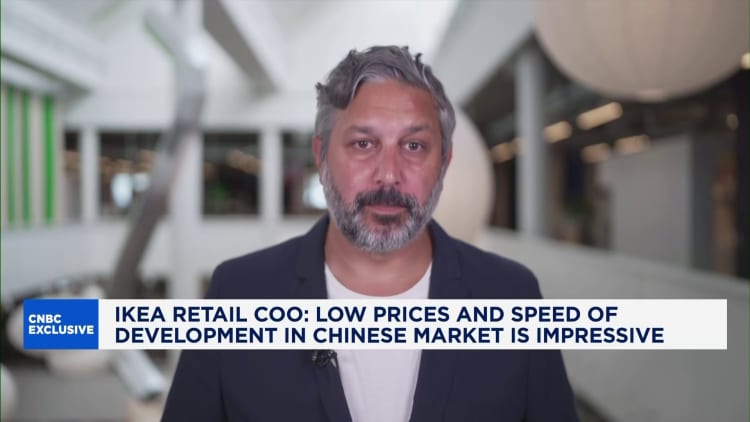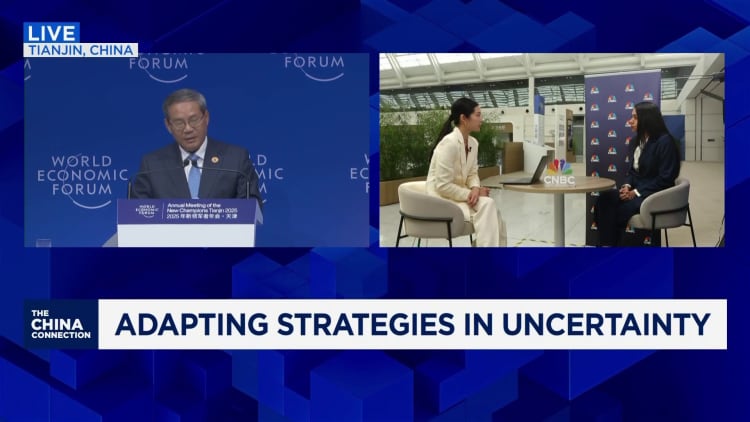Employees at a coal mine in China’s Shaanxi province sit in an office to use digital systems for mining work, according to a photo taken on April 26, 2023, during a media tour organized by Chinese telecoms giant Huawei.
Wang Zhao | Afp | Getty Images
This report is from this week’s CNBC’s The China Connection newsletter, which brings you insights and analysis on what’s driving the world’s second-largest economy. Each week, we’ll explore the biggest business stories in China, give a lowdown on market moves and help you set up for the week ahead. Like what you see? You can subscribe here.
The big story
Life in China these days is a story of stark contrasts.
If in one conversation, my counterparts are wringing their hands over a sluggish economy, the next reveals how quickly artificial intelligence is revamping industries.
Case in point: Chinese smartphone company Honor told CNBC its newest foldable set for release Wednesday will be the thinnest phone on the market to date at just 8.8 millimeters when folded — undercutting even the rumored thickness for Samsung’s forthcoming foldable — thanks largely to its AI manufacturing tools.
Honor said it found the optimal combination of slimness and strength by using its “1-billion parameter AI industrial model” to simulate more than 125,000 options for device assembly. The company said AI-powered 3D scanning allowed it to achieve precision control of 0.003 millimeters, or about 1/20th of a human hair.
In all, that’s a 1.1-millimeter slice off its first foldable launched in July 2023, when Honor made waves in the smartphone market with a device that folded up to be nearly as thin as an iPhone.
But it was also two summers ago when I recall that much of the post-Covid economic excitement was fading in China.
Conversations shifted from celebrating the end of lockdowns to bemoaning lackluster consumption. The pessimism also created a domestic market challenge for Honor’s foldables, which typically start at the equivalent of over $1,000 each.
A pivotal phase
Looking back, Honor is not the only major Chinese company to have made strides over the last two years. Chinese smartphone company Xiaomi has launched two electric cars to directly compete with Tesla. DeepSeek was officially registered as a company in July 2023, according to records, before launching its breakthrough AI model in January this year.
AI’s pervasiveness has also started to penetrate the “less flashy” parts of China’s economy.
In July 2023, Huawei launched a dedicated AI model for commercial mining with mining company Yunding Technology and state-owned Shandong Energy Group. The model, based on its foundational “Pangu” model, allowed workers to operate mine equipment remotely from an office and develop other tech solutions more quickly.
Fast-forward to 2025, and the AI tech has been integrated in more than 100 mines, according to Huawei’s annual report released in March. In May, the company’s client in Inner Mongolia launched 100 self-driving electric trucks for a local coal mine.
Huawei last month revealed a new, 5.5 version of its Pangu foundation model, and on Monday, released an open source version for developers.
Foreign companies are also spurring technological innovation on the mainland, such as German industrial giant Siemens.
Out of 18 AI-integration related products Siemens just launched, 16 were developed in China in just nine months, Peter Koerte, the company’s chief technology officer and chief strategy officer, said last week during the World Economic Forum conference in Tianjin. He described applications such as AI-powered energy savings systems for buildings.
These technological breakthroughs are the result of years or months of painstaking development, but it’s only more recently that businesses are reaping the rewards.
“AI is transforming from isolated technological innovation into something that is core or embedded in the whole business process,” Janet Tang, Hong Kong-based partner and managing director at AlixPartners, told me last week on the sidelines of the conference in Tianjin.
She stated that the significant integration of AI with business operations began roughly 12 months ago, following extensive trial and error over the past few years.
Economic impact
While China’s biggest cities are yet to see a return to the pre-Covid boom days, there are signs that the rapid urban growth has instead spread to smaller cities and even rural areas.
Malipo, a Yunnan county once so poor it has received targeted assistance from the foreign ministry, started revamping its “Tianbao” land trading port on the border with Vietnam in 2023. The county even courted Hong Kong’s Sunwah Group to invest 50 million yuan to open a tea processing plant in the same year.
The port has since seen a surge in durian trade, while plans are underway to open a tourist attraction with Sunwah in the county, allowing visitors to see tea trees that county head Xiao Changju claims are several hundred years old. She was speaking to reporters during a state-organized trip to the region in May.
Augmented reality glasses startup Xreal invested in its own factory in the southeastern “tier 2” city of Wuxi and earlier this year announced a new glasses product running Google’s XR operating system.
The company is also moving its headquarters from Beijing to Shanghai this summer to be closer to its specialized factories in Wuxi that make optical parts and other components, CEO and founder Chi Xu told me on the sidelines of the World Economic Forum’s event in Tianjin last week.
Xu hopes that his products can reach consumers by the end of this year, while noting the U.S. remains the top market for Xreal.
“I’m always impressed by the level of energy, hardworking and openness of the enterprises here in China,” AlixPartners’ Tang said. Despite protectionism or other challenges, “everyone is still so motivated, so eager to learn new things and to connect with the rest of the world.”
Top TV picks on CNBC
Grant Pan, Group CFO of Noah Holdings, said that investors are looking to diversify their assets away from just the U.S. and China markets.

Tolga Oncu, COO of Ingka Group, which manages IKEA, discussed the competition and opportunities he sees in China, especially in the ‘silver’ economy.

Aditi Rasquinha, CEO of DHL Global Forwarding Greater China, stated that the region’s export growth has remained resilient despite a slowdown in U.S.-China trade.
Need to know
In the markets
The performance of the Shanghai Composite over the past year.
Mainland China and Hong Kong stocks inched higher amid mixed trading in the region, as investors digested the latest comments from U.S. Federal Reserve Chair Jerome Powell.
— Lee Ying Shan
Coming up
July 2: Honor to release its next foldable phone
July 3: Caixin Services PMI
July 5: Legoland opens its first China resort in Shanghai
July 9: CPI and PPI for June
World economy,India,China,business news
#slowing #economy #meets #fast #future

